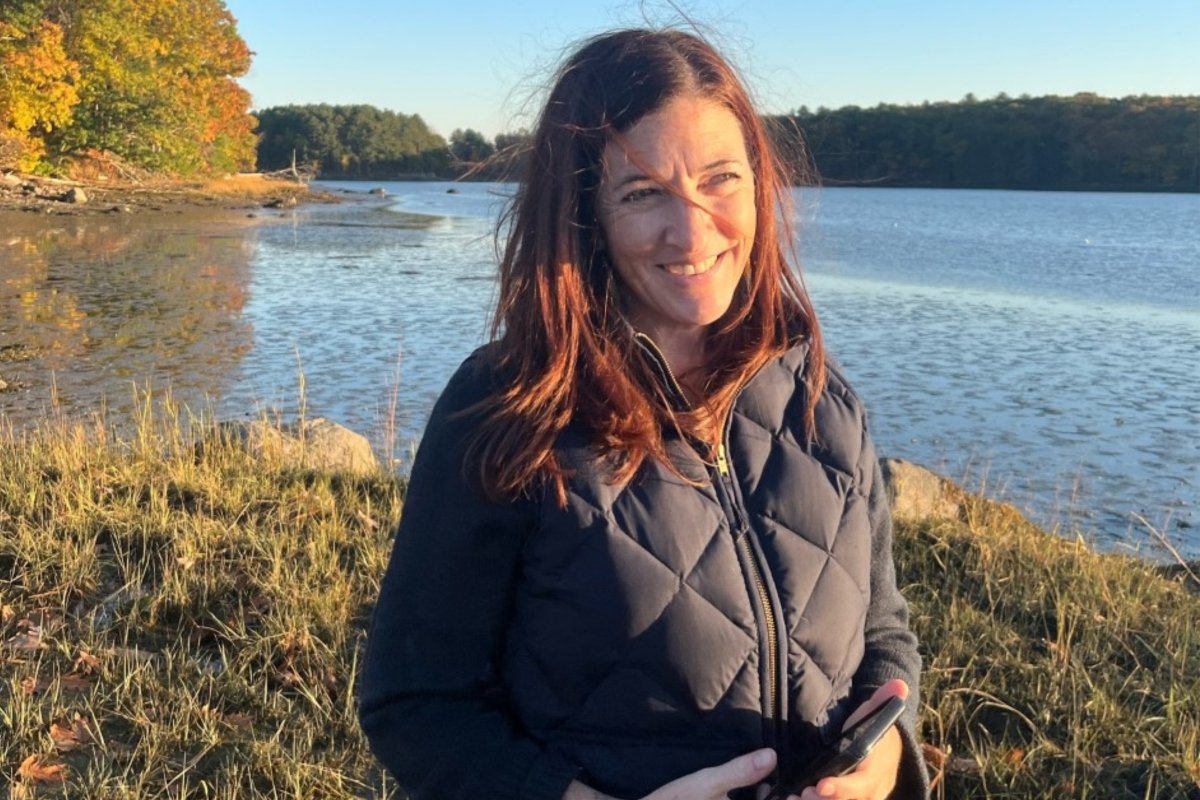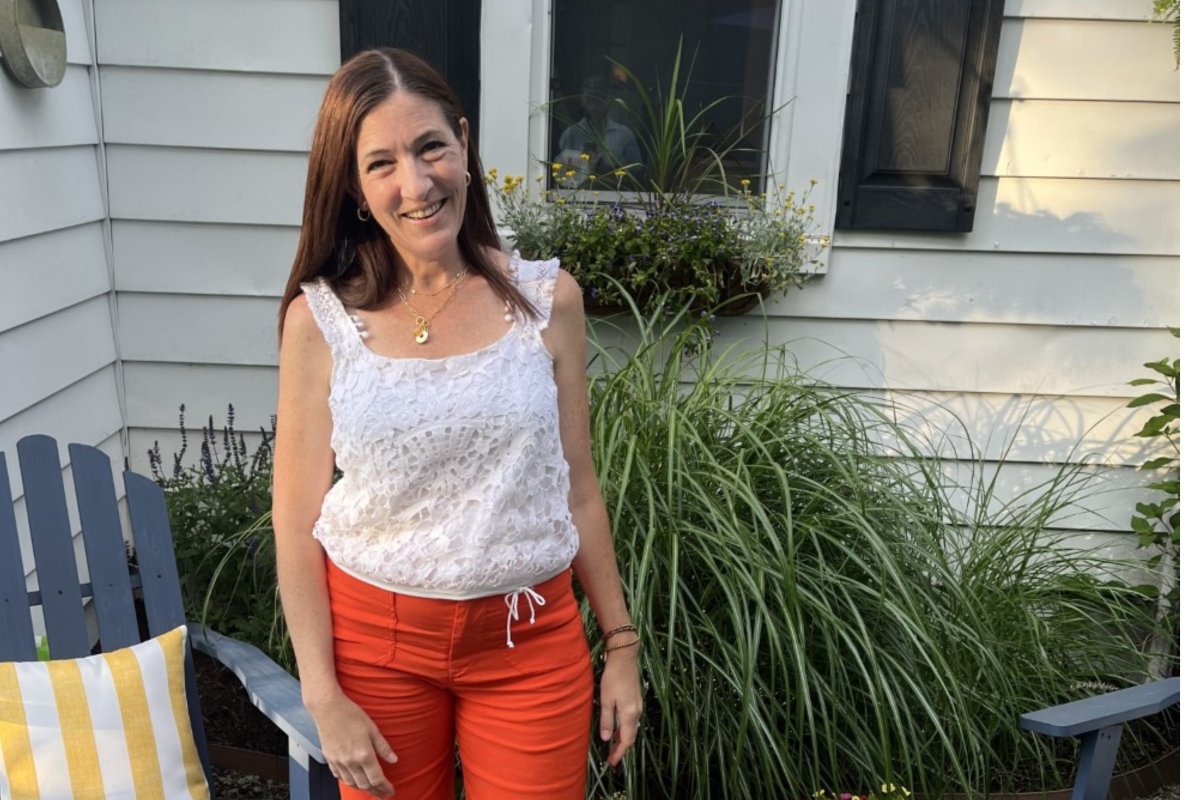I'm standing in the foyer of my friend's house. My husband and I have just arrived for a holiday party. We are saying "Hello" and "How have you been?" to our friends when it happens. The familiar fire that has been simmering inside my body since I hit my mid-40s ignites.
It is as if my blood has suddenly been placed on a quick-boil stove burner. Immediately following is a burst of perspiration, which seeps out all over my body so I feel like a pin-pricked water balloon.
There's a reason they call it a hot flash.
My friend's husband leans in to hug me. As he wraps his arms around me, I wonder if it is better to hope that by some small miracle he doesn't notice my back is now damp with sweat or to say something? But what do you say?
"Hey, great to see you but I'm having a hot flash, so how about a fist bump tonight instead?"
I decide to say nothing and my worries shift. Can everyone actually see the sweat on my forehead? Is the makeup I applied a half hour ago melting off my face? Why, oh why, does no one prepare you for this?

Ageing as a woman
Even though I've been in it for a few years, I'm still trying to wrap my head around this midlife transition we only seem to talk about in whispers. As a 49-year-old mother of two, I have spent many hours with friends talking about puberty—how our kids are stretching upwards, growing facial hair, or getting curves in places they didn't have the month before. But acknowledging that, as mothers in our 40s, our own bodies were also going through a significant transition? That didn't usually come up in casual conversation.
Hot flashes aren't the only issue that has surfaced for me in the past few years, they are just one of the hardest to hide from others. I can't remember the last time I slept through the night. The hour of 3 a.m. and I are good friends. We hang out every night for about 60 minutes or so—usually with our other friend, anxiety, who has been around for a long time but has been sent into overdrive with the hormonal shift of perimenopause.
No matter how hard I try to ignore it—and believe me I do—this transition is happening. I can see it in the mirror. I can feel it in my body. I am reminded of it every time I open Instagram and see that my feed is filled with ads for wrinkle creams, serums, and face oils all promising the same things—maybe just a little more time with smooth skin, perhaps just one less wrinkle.
I think about it every time I notice another creaseless forehead on a woman around the same age as me and wonder if very soon, my reluctance to smooth my own face with injectables will make me and my crows feet the anomaly.
How older women are treated
It isn't just my body that has changed, the way people treat me is altering as well. Sometimes it is barely perceptible; the gradual shift from "ma'am" to "miss." Other moments are starker. Like the time at a summer BBQ when a younger partygoer cheerily told me she thought I looked, "Pretty good for someone over 50." I was only 47 at the time.
In talks for a new job a few years ago, I was told it might be better to downplay my "experience." According to the recruiter, experience might turn off the hiring manager.
How, I wondered, does one go about doing that? Should I delete previous positions from my LinkedIn profile? Doctor the year I graduated college on my resume? A few days later, without even an interview, I was forwarded an email from the hiring manager—it said I was "too seasoned" for the role. Those were the exact words, as if I was an over-salted hunk of meat.
The resounding message is clear—age is the enemy and you aren't supposed to go down without a fight. You should rail against it and soldier on; embrace the mindset that 50 is the new 40, while remaining the same jean size you were in your 30s. Because that's empowering, right?
I often find myself wondering why we are afraid to talk about this elephant in the room—that women age; we go through menopause, we get wrinkles. Why are we generally comfortable talking openly about puberty but not that periods stop? Is it because we view puberty as something gained, whereas menopause is something lost? Are we really only our best selves before the age of 40? I sometimes wonder if the act of aging has now been layered with so much shame that most of us would prefer to feign ignorance of its very existence.
What if instead we were just honest?
Embracing the truth about ageing
What if we just said, here I am—a middle aged woman. I have hot flashes. Sometimes, my hormones make me a little crazy. I might put on a few extra pounds. My periods are ending, or they have ended. It is normal, it is an experience that most women will go through, and one that we should not be ashamed to talk about.

What if I just admit that I might not always keep up with dying my hair every six weeks. Sometimes it is because I'm just tired of the fight; because I just want to be who I am now and not keep trying to stay as the person I used to be.
Because there is more to me than what you see on the outside. Yes, I look different than I did at 25, but I also feel different. I am filled with decades of that experience.
I have raised children, worked at dozens of professional jobs, learned how to deal with many different challenges in ways I didn't know how to until I had been through them myself.
When you spend years waking children up, getting them to school, running to work, racing back for school pick up and then putting dinner on the table before eventually tucking your kids into bed—you learn to juggle many tasks at once. When, within an hour, you have gone from coddling a screaming toddler or cheering on the sidelines of your teen's game to running a meeting or chatting with a new client—you know how to navigate different situations and communicate much more effectively.
When you have dealt with periods of financial stress, loss, a medical crisis—you learn how to pick yourself up and move forward.
I am also more myself than I have ever been. As a young woman, I often had doubts about myself and my abilities. Today, at 49 years old, I know my strengths and am confident in what I can do.
Nowhere is this more apparent than in my writing and my work as a writing instructor. When I began my career in the 1990s, I modeled my writing after others. I never wrote about myself or my experiences.
Now, more than 20 years later, I trust my instincts and my own voice. I know that I have something to say. In my teaching, instead of telling my students to copy someone else's writing style—I help them find their own.
So, I am deeper than a wrinkle. And maybe wrinkles aren't so bad. Maybe a wrinkle is a sign of life—of laughter, tears, joy, worry and sorrow.
Perhaps a life well lived is worth a few of those.
Darcey Gohring is the founder and host of the Zibby Mag Online Writing Community, and a writing instructor for the Writers Circle and Zibby Classes. She specializes in personal narrative and memoir. Gohring is completing work on her debut novel. You can follow her on Twitter @darcey_gohring.
All views expressed in this article are the author's own.
Uncommon Knowledge
Newsweek is committed to challenging conventional wisdom and finding connections in the search for common ground.
Newsweek is committed to challenging conventional wisdom and finding connections in the search for common ground.
About the writer
To read how Newsweek uses AI as a newsroom tool, Click here.








